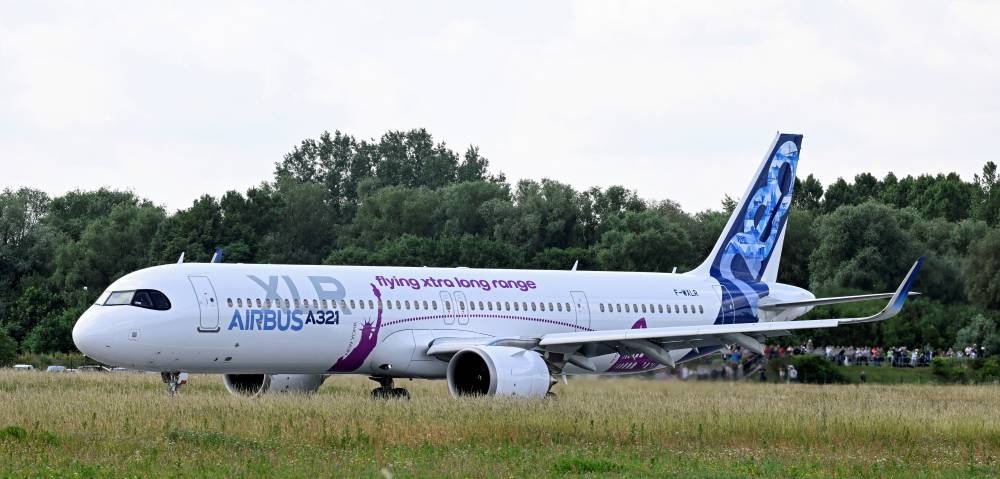Airbus has delivered its first A321XLR jet to Spain's Iberia, the European planemaker said, stepping up a battle with Boeing in the middle of the jet market.
The plane, which took five years to develop and targets a market previously served by Boeing's out-of-production 757 or larger wide-bodies, was handed over late on Tuesday and was due to fly to Madrid, according to Flightradar24 data.
The delivery, first reported by Reuters on Tuesday, highlights a drive by Airbus and Boeing to extend the performance of the industry's best-selling single-aisle jets.
Launched in 2019 to steal a march on Boeing's plans at the time to build a new jet in the middle of the market, the A321XLR targets a gap left by the out-of-production Boeing 757, where the A321 family outsells the largest versions of the 737 Max.
The industry's largest single-aisle jet features a novel type of fuel tank, moulded into the contours of the fuselage to eke out more space for fuel and deepen its transatlantic range.
The design initially raised concerns among regulators about the risk of fire and evacuation times in the event of an accident, prompting design changes before it could be certified.
Analysts say the resulting extra weight chipped away at its maximum range, though Airbus says the roughly 200-seat model will still allow airlines to open up multiple new routes.
Iberia plans to introduce the A321XLR on flights from Madrid to Boston after a handful of trials in Europe.
Airbus said it had sold over 500 A321XLR jets, which will be delivered in coming years, reflecting long industry lead times.
Boeing has said the XLR addresses only a small niche in the overall market for single-aisle jets, the busiest part of the industry, which it pegs at 33,380 aircraft over 20 years.
Critics have also questioned the impact of the range on running costs, suggesting the aircraft and engine will be pushed to their limits and require more frequent maintenance.
However, the delivery also exemplifies pressure on Boeing to win certification for its own largest single-aisle, the 737 Max 10, following delays by an issue with an anti-ice system. Boeing has said the timing of certification is a matter for regulators.
Iberia has said that the arrival of the A321XLR would help it comply with its environmental commitments, part of an industry-wide effort to eliminate net CO2 emissions by 2050.
The airline plans an event on Nov. 6 to celebrate the latest milestone, though several observers noted the industry's usual tight discipline on carbon-neutral messaging was dented by the choice of registration marked on the plane's fuselage: EC-OIL.
The latest Airbus and Boeing single-aisle jets use engines that the industry says will burn at least 15% less fuel.
The jet delivered to Iberia is powered by LEAP engines from CFM International, owned by GE Aerospace and Safran. RTX unit Pratt & Whitney also offers engines for the jet.
Meanwhile Saudi Arabia's new national airline, Riyadh Air, announced on Wednesday it has ordered 60 narrow-body aircraft from Airbus, as it prepares for takeoff next year, reports AFP.
The carrier, created last year, has reached "an agreement to purchase 60 Airbus A321neo single-aisle aircraft in the latest step towards its maiden flight in 2025", it said in a statement.
Saudi Crown Prince Mohammed bin Salman sees aviation as a key component of his "Vision 2030" reform agenda to remake the petroleum-centred country, aiming to more than triple annual traffic to 330mn passengers by the end of the decade.
He announced the creation of Riyadh Air in March 2023. It is owned by the Saudi sovereign wealth fund, the Public Investment Fund.
The deal announced on Wednesday is Riyadh Air's second major purchase after it agreed last year to buy 39 wide-body Boeing Dreamliners, with options for 33 more jets.
The new "multi-billion dollar" deal brings the firm's total aircraft orders to 132 and "positions the airline for efficient flight operations by having an optimal fleet mix to fulfil its network ambitions of 100 destinations by 2030," the statement said.
Saudi officials in November 2022 announced plans for a large new airport in Riyadh.
The existing flag carrier, Saudia, is headquartered in the coastal city of Jeddah.
Some analysts have questioned the feasibility of Riyadh Air's goals, describing the regional market as already saturated.

Airbus A321XLR takes off for its maiden flight at Hamburg-Finkenwerder Airport, Germany (file). Airbus has delivered its first A321XLR jet to Spain's Iberia, the European planemaker said, stepping up a battle with Boeing in the middle of the jet market.
